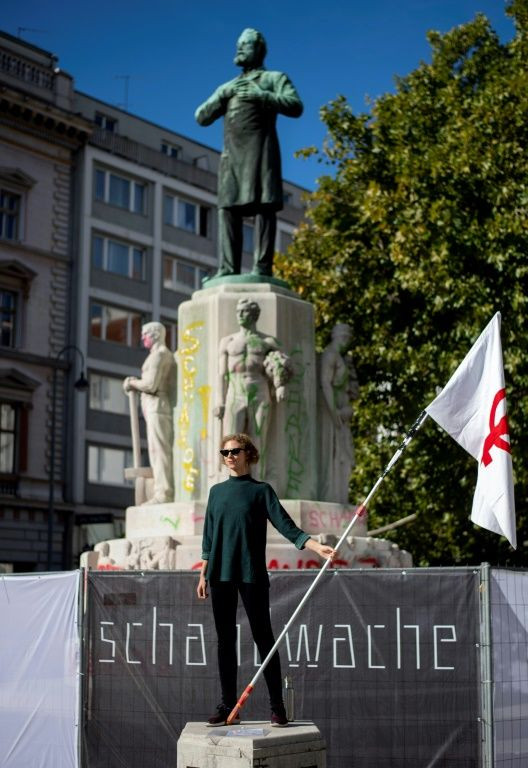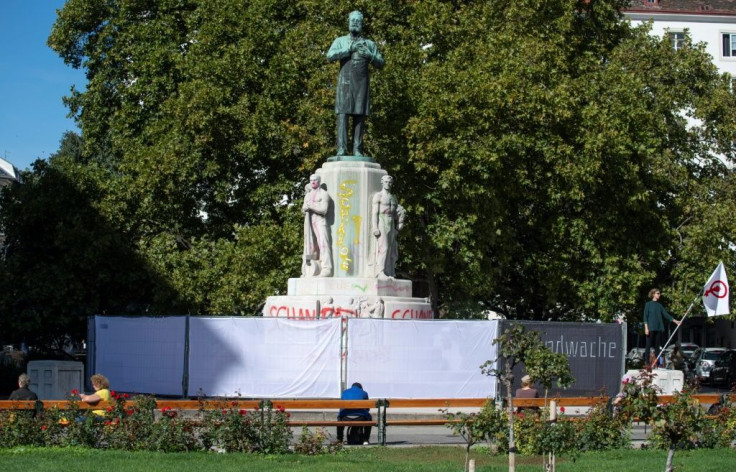Anti-Semitic Ex-mayor Becomes Magnet For Vienna Statue Protests
A statue of an anti-Semitic former mayor of Vienna who inspired Hitler has become the focus of competing left- and right-wing protests, with anti-racist activists mounting a "shame vigil" around the monument.
The likeness of Karl Lueger, on a prime spot on Vienna's imposing Ringstrasse boulevard, has been defaced several times in recent months with graffiti reading "Schande" ("Shame").
Galvanised by protests around historical monuments elsewhere in the world and the Black Lives Matter movement, an artists' collective took matters a step further and fixed two sets of concrete, gold-painted letters spelling "Schande" to the statue's plinth on Sunday night.
The collective then set up a "shame vigil" at the site to prevent the city from removing the words.
Jewish and Muslim youth organisations, feminists and left-wing groups are also taking turns manning the vigil.
However, a group of men described by Austrian media as far-right activists removed the gold letters with a hammer and chisel on Monday.
The police then cordoned off the statue.

As a group of secondary school students passes by the statue in warm autumnal sunshine, their teacher explaining the controversy around the monument, Simon Nagy, one of the artists who started the vigil, tells AFP that Lueger "belongs on the manure heap of history" and that the statue should be in a museum.
But the city authorities are planning to clean the graffiti by Friday, an announcement that has galvanised the 25-year-old and his group.
Nagy says the artists want the graffiti to remain and are demanding that the city comes up with a plan to redesign the monument, but he is disappointed at the lack of action.
Karl Lueger was mayor from 1897 until his death in 1910 and oversaw a period of transformation in which Vienna's population boomed to more than two million and much of its modern infrastructure was built.
He built up a cult of personality that lived on after his death, with the statue unveiled in 1926.

But his notoriety stems from his ascent to power.
In his rhetoric he railed against what he called Jewish influence over the press and sources of capital and called for the "liberation of the Christian people from Jewish dominance".
This "particularly aggressive anti-Semitism" was central to his election as mayor, according to historian Florian Wenninger.
"He built his political career on the hatred of a minority," according to Wenninger, even if he opportunistically tried to move away from this once in office.
Hitler used Lueger as an early role model and cited him approvingly in "Mein Kampf".
After much controversy, a portion of the Ringstrasse -- a circular boulevard in the city -- previously named after Lueger was renamed in 2012.
Having served on a commission set up by the city authorities to look into potentially problematic street names, Wenninger is well aware of the sensitivities around historical monuments.
"Something which in and of itself doesn't have any real-life relevance for people becomes a part of their identity when it's attacked," he explains.
"Then there is a reflex where people say: 'Stop! This is crazy!'"
Wenninger says Austria's tradition of consensual politics, even at a local level, has meant debates over controversial issues have often been avoided.
Long cast in the role of a victim of Nazi Germany, it is only in recent decades that Austria has begun to seriously examine its role in the Holocaust.
The discussion of Lueger's place in history is part of this process of revision and comes ahead of city council elections on Sunday.
But the signs are that most of today's politicians are seeking to steer clear of the controversy.
The Social Democrats, who are on course to remain in power at Vienna's City Hall, said the monument had "already been appropriately contextualised", referring to a small explanatory tablet erected near the rear of the statue in 2016.
As for the centre-right People's Party, in power at a national level, they say they reject Lueger's anti-Semitism but at the same time recall that he was "one of Vienna's most influential mayors and an important moderniser of the city".
© Copyright AFP 2024. All rights reserved.





















